People development

Area, strategic goals and metrics
- Maintaining employee satisfaction and loyalty at no less than 65 % by 2025
Key projects and highlights of 2022
- Increasing average annual training hours per employee to 123 hoursby 2025
- Promoting retraining and professional development
- Investing in future talent
Key projects and highlights of 2022
- Motivating the staff to increase productivity and deliver strong operating results, retaining qualified talent
- Training future top managers from among internal candidates
Key projects and highlights of 2022
Key projects and highlights of 2022
- Building an inclusive environment for disabled people, adapting workplaces and municipal infrastructure to their needs, and employing more such people depending on business requirements
Key projects and highlights of 2022
- Providing all employees with opportunities for professional and career growth
Key projects and highlights of 2022
Our key asset is talented, professional, and committed employees that share our corporate goals and values. The Company’s entire HR framework is geared towards recruiting, supporting and motivating employees to achieve the most ambitious goals. To this end, we provide a wealth of opportunities to enhance skills and knowledge, take consistent efforts to foster a culture of safety, equality and respect, and offer competitive salaries and social benefits.
- A top 100 Russian employer according to hh.ru
- Gold status in the 2022 rating of Russia's best employers from Forbes
- Winner among industrial companies according to Delovoy Peterburg
- Grand Prix of the national competition of youth employment best practices in the category Best Practices in Preserving the Region's Youth Talent Potential
- Two employees recognised as winners of the Engineer of the Year contest
- Three employees named Russia's Professional Engineers
- The Company's employees received 17 state awards, including one medal of honour for labour achievements from the Russian President


We rely on a robust performance management system that covers all levels – from individual employees to the Company as a whole – to ensure PhosAgro's sustainable growth in line with its goals.
New-generation employees are aware of how important personal and professional growth is as it is a key to success and self-fulfilment in the constantly changing world. For many, high remuneration is no longer the main incentive, with self-fulfilment coming to the forefront if the Company invests heavily in developing the skills and competencies which will be in demand going forward. This is why we place a strategic emphasis on supporting our people's drive for self-improvement. We seek to create the right environment for them to fully unlock their potential.
HR management principles
The reporting year saw a new version of the UK Modern Slavery Act Transparency Statement approved, which discloses contributions towards the UN SDGs and the Company's social projects to combat violations of human rights. Over the last three years, over 19,000 employees received additional training in human rights and corporate ethics.
All relations between PhosAgro and its employees are regulated by the Labour Code of the Russian Federation and comply with the requirement to provide employees with a timely notice of material changes in employment terms, thus respecting human rights.
- organisational change management system;
- personnel attraction and recruitment system;
- personnel training and development system;
- incentives and rewards system;
- social benefits system;
- corporate communication system;
- working hours and leisure;
- respect for human rights and non-discrimination.
We negotiate collective bargaining agreements with trade unions that address issues such as working conditions and compensation for employees at each of our production sites (usually for a three-year period, covering 100% of the employees of Apatit, its branches and standalone business units).

Non-discrimination policy and human rights
Our goal is to keep our working environment free from discrimination based on nationality, gender, age, faith or other grounds as required by the applicable laws.
PhosAgro is committed to respecting employees' rights as required by the International Bill of Human Rights and the ILO Declaration on Fundamental Principles and Rights at Work, including zero discrimination, not using child or forced labour, respecting their right to exercise freedom of association and collective bargaining, and creating a safe and favourable working environment for both its own employees and the employees of its contractors, which are also expected to comply with such requirements and regulations.
PhosAgro Group appreciates and encourages diversity among its employees. We provide equal opportunities for them to unlock their potential and do not tolerate any restriction of a person's or a group's natural rights and freedoms or any conduct violating privacy of our employees.
Any decisions regarding promotion, hiring, remuneration, benefits or compensations are based solely on the employee’s qualifications, performance, skills and experience assessed impartially and fairly.
We expect our employees to treat their colleagues and everybody else, including customers, suppliers and other stakeholders, with due professionalism, respect and fairness.
We consider unacceptable any restriction of employee rights or freedoms, whether at workplace or in any other job-related environment.
Since 2013, we have conducted annual employee surveys enabling each employee to give feedback on the performance of the Company and its management. Throughout the history of such surveys, we have not received any negative feedback or reports of violations of human rights. This clearly indicates that all obligations to PhosAgro’s staff are respected and met.
The Code of Ethics
In our operations, we seek to maintain an impeccable reputation and comply with ethical business practices. PhosAgro adopted a Code of Ethics in 2014 and updated it in 2021. It applies to all employees and is the Company’s primary document that clearly defines our corporate culture, rules and regulations for collective behaviour within the Company, business and social relationships, and interactions with other stakeholders. When agreeing and concluding contracts with external contractors, it is an imperative for us to cover arrangements and commitments related to mutual respect of human rights and compliance with the Company's Code of Ethics.
The Code outlines our common values and underpins our success, helping us avoid unjustified risks, maintain long-term business growth, strengthen our position in the Russian and foreign markets, and increase the Company’s value for shareholders and other stakeholders.

Inclusive environment
In 2022, the Group employed 88 employees with disabilities (according to the average headcount). We believe we must exercise an individual approach when hiring people with special needs, and we are aware of our responsibility to create an inclusive environment for them.
The Company honours all its obligations related to the employment of the disabled as required by applicable laws. In addition, we rely on job quotas in hiring the disabled, support and provide an expert opinion at Abilympics, a competition for the promotion of disabled people’s professional expertise, take an active part in job fairs for the disabled, and sign workplace lease agreements with other companies. Going forward we plan to expand our practices of building an inclusive space.
The Company’s key production sites are located in the Murmansk, Vologda, Leningrad, and Saratov regions. As a major contributor to the local economy and one of the largest employers in these regions, PhosAgro has a significant positive impact on social development and welfare across its geography.
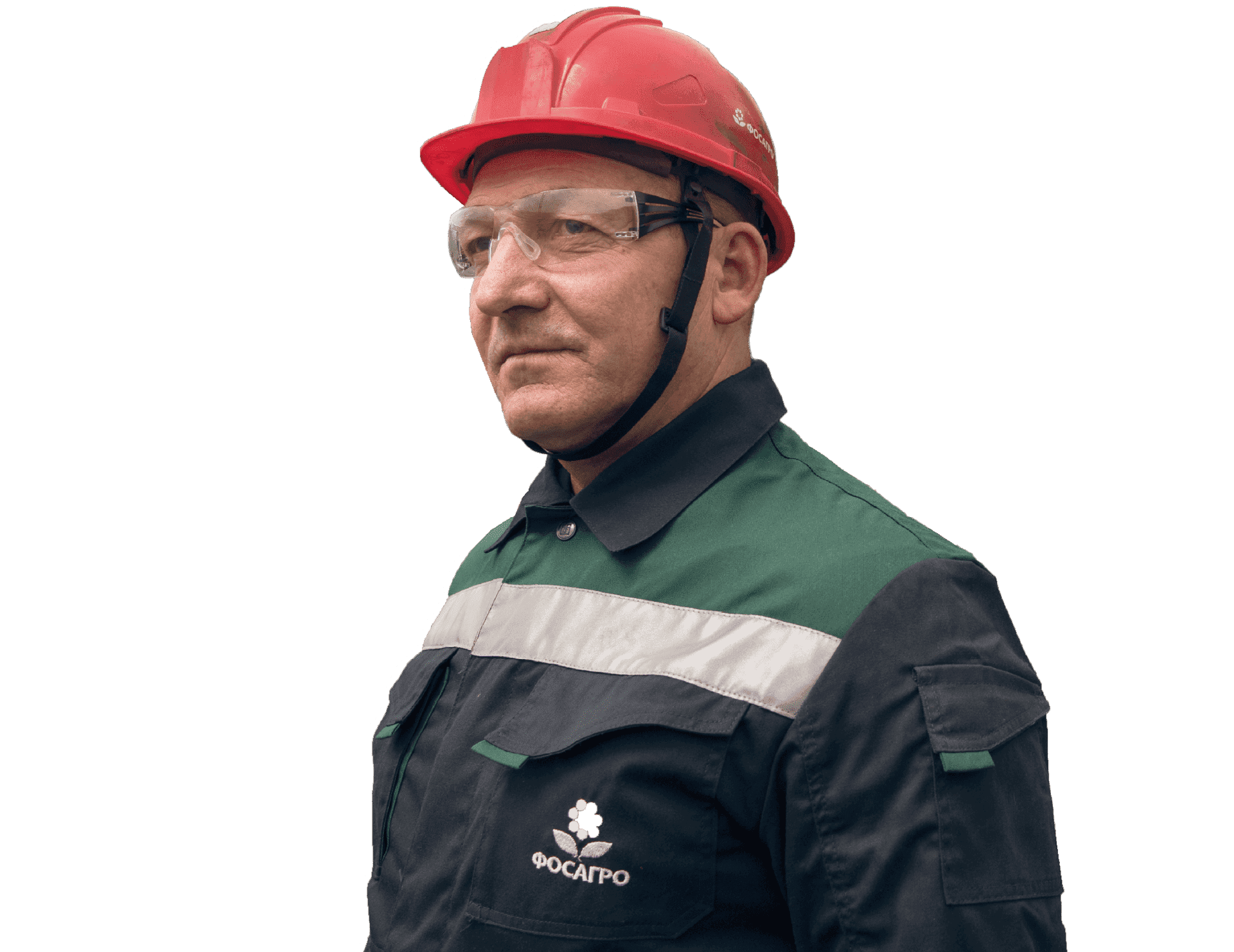
Access to multiple communication and feedback channels within the Company allows our employees to resolve employment and other job-related issues. Some of the formats are Q&As in corporate newspapers, information sessions for the staff and management, a corporate portal, a hotline, and official social media accounts of our branches.
Any employee or other stakeholder can use PhosAgro’s whistle-blower hotline to report human rights violations or discrimination of any nature, or to communicate any other issues or concerns related to employer-employee relationships.
We keep introducing popular cutting-edge technologies in corporate communications. These include personal accounts for employees, a corporate mobile app with self-service options, and a chatbot, along with new capacities we added to our corporate portal, online training platforms, automated HR management system, and many more.
The following strategic risks affect our HR management objectives:
The Company develops corrective measures as necessary and unlocks opportunities to mitigate those risks. Below you can find more information about what we do on this front.
Risk areas specific to HR management

As part of its comprehensive recruitment approach, PhosAgro continuously monitors the labour market in Russia to attract skilled staff and efficient managers with work experience at leading national and global companies, always determined to be one step ahead of the curve.
Our recruitment efforts are underpinned by a consistent career guidance model, which prioritises engagement with school and university students.
The Company works continuously to improve its recruitment processes. In 2022, we completed the first stage of recruitment automation to ensure faster communication with candidates and customers, while also reducing the time it takes to fill vacancies and minimising the labour inputs along the way.
We also set up a recruitment centre to enhance the process across all our sites.
If two or more candidates qualify for a job, we are more likely to pick the one who is either:
- a young talented professional (a programme for attracting, mentoring and upskilling high-potential university graduates);
- an employee included in our talent pool (a programme for those looking to develop professional and managerial competencies for career growth).
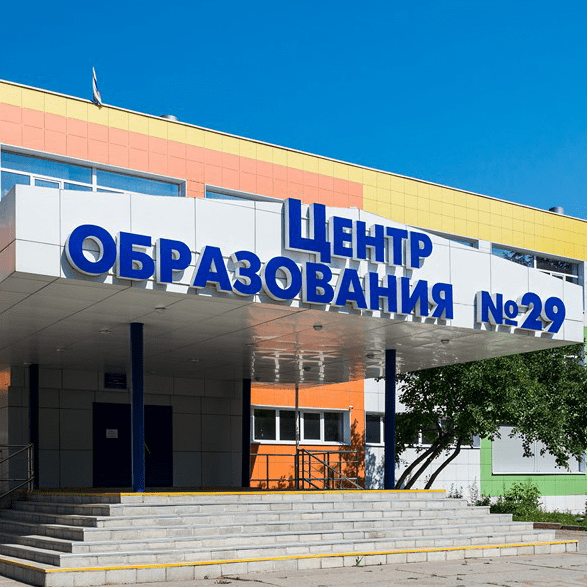
The PhosAgro Schools projects focuses on cooperation with schools across our footprint. By creating the right environment at schools, we help guide graduates in their career choices. In 2022, we engaged with six schools across our geography.
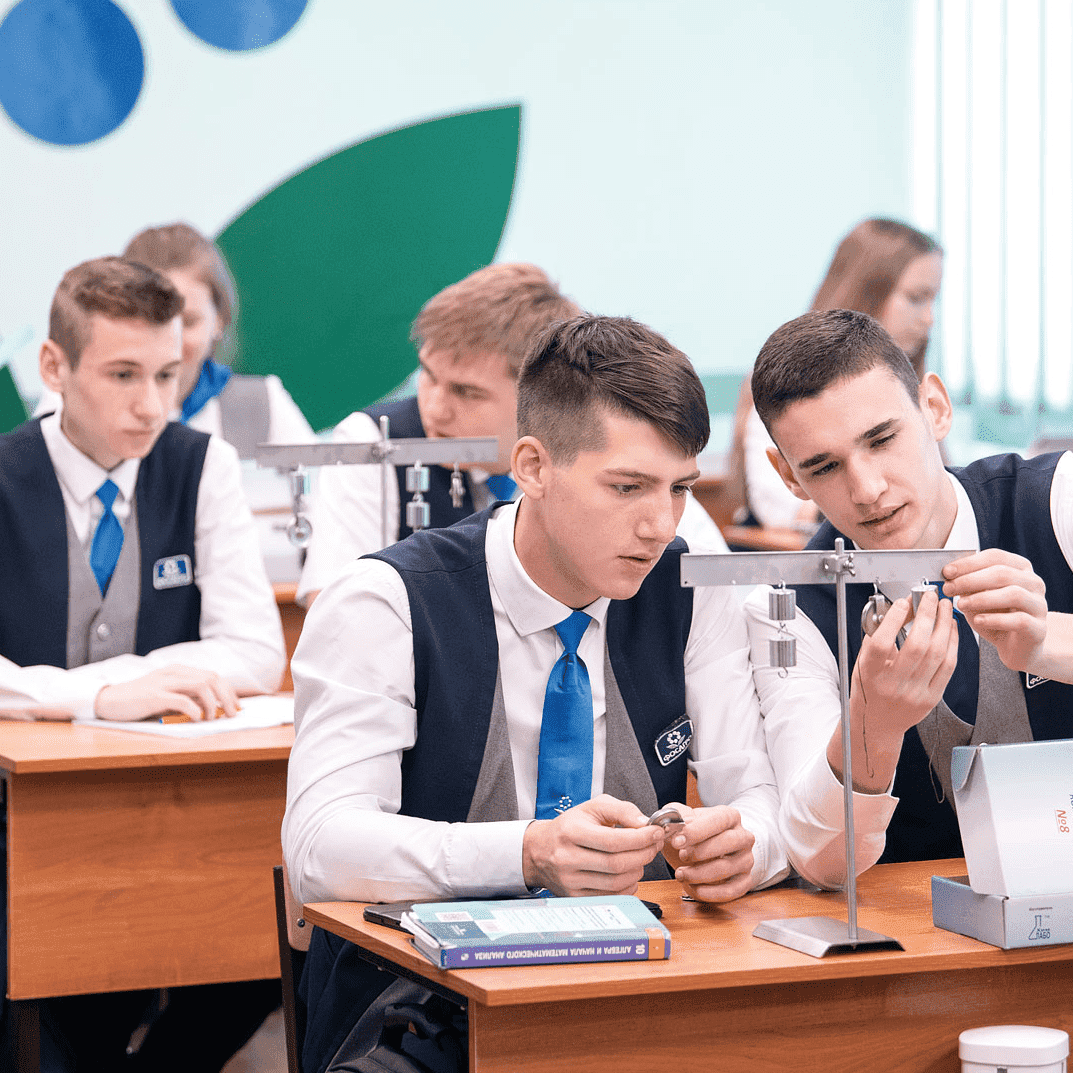
As part of our collaboration with secondary vocational institutions, we seek to create a pipeline of skilled employees with relevant competencies who are competitive in the labour market, acquainted with allied professions, and have what it takes to pursue career opportunities for their further employment with the Company.
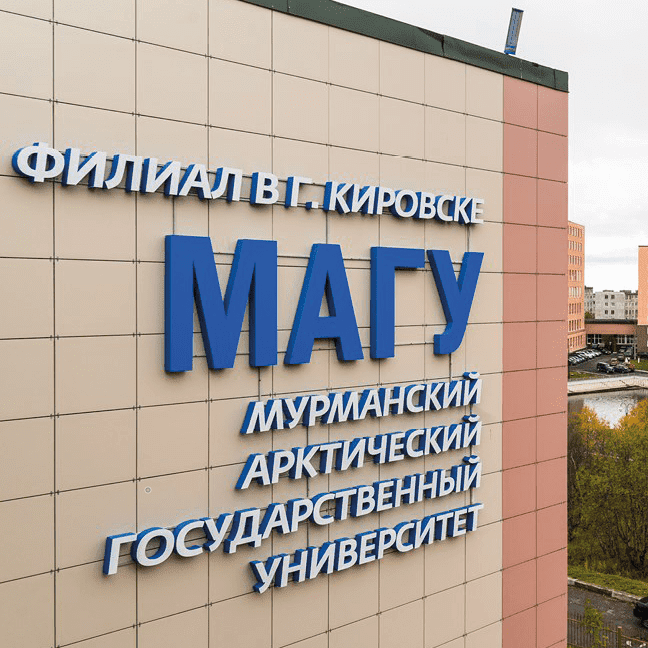
Cooperation with universities serves to fill the most relevant jobs by attracting and retaining talented graduates. Today, the Company actively collaborates with 24 universities that offer courses relevant to its core activities.
To enhance women’s social security in accordance with the applicable laws, the Company:
- does not use female labour for manual lifting or carrying weights exceeding maximum allowable limits;
- releases pregnant women from their job duties and transfers them, subject to their medical reports, from production sites to lighter-duty positions;
- provides women, at their request, with a parental leave until the child reaches the age of three;
- prohibits business trips, overtime or night work, work on weekends and public holidays for pregnant women, except when there are a written consent and no contraindications;
- safeguards employment of pregnant women, with their employment contracts terminated only in the event of liquidation of the facility, as well as that of women having children up to three years of age and single mothers having children up to 18 years of age.
- Superfinals of the Young Manager – 2022 competition – 9 men, 3 women.
- Superfinals of the Mentor of the Year – 2022 corporate contest – 10 men, 3 women.

The decrease in productivity due to the growth of the Company's headcount as a result of bringing equipment repair and maintenance functions back in-house, with a view to improving the quality and efficiency of the work.
Annual employee survey
For ten years now, the Company has been conducting annual Growth Area employee surveys which serve as a basis for subsequent remedial action plans designed to address employee concerns. In 2022, the Company collected 13,773 completed survey questionnaires (with the headcount standing at approximately 19,800 employees). The employee satisfaction and loyalty index came in at 69% (up 12 p.p.
These results reflect positive changes in the Company and the effectiveness of corrective actions based on the outcomes of the annual Growth Area surveys. We plan to continue surveying our employees on an annual basis going forward, while also arranging pulse survey on dedicated subjects more frequently.
The aggregate satisfaction and loyalty index demonstrated significant growth to reach its all time high (since 2013 when the Company’s first started measuring these metrics).
Training and evaluation
PhosAgro’s management seeks to attract highly skilled professionals and young talents, with heavy emphasis placed on providing professional development opportunities, promoting professional growth and encouraging production initiatives and in-house expertise.
We offer a wide range of training formats for our people, including in-person training, on-the-job training, internships and online education. The COVID-19 pandemic came as a challenge from the perspective of ensuring employee training, development and assessment continuity, but also as a growth driver. The use of remote training capabilities became possible due to the implementation of new automated solutions and services which facilitate qualitative employee assessment, prompt identification of personnel management risks, and enactment of management initiatives for improving process efficiency.
In 2022, we continued to enhance the expertise of professionals responsible for the assessment of candidates and employees as part of recruitment and development processes. We actively use psychometric assessment tools by leveraging the potential of new automated solutions and services introduced in 2021. These tools are applied in full compliance with the regulations on their use approved by the Company.
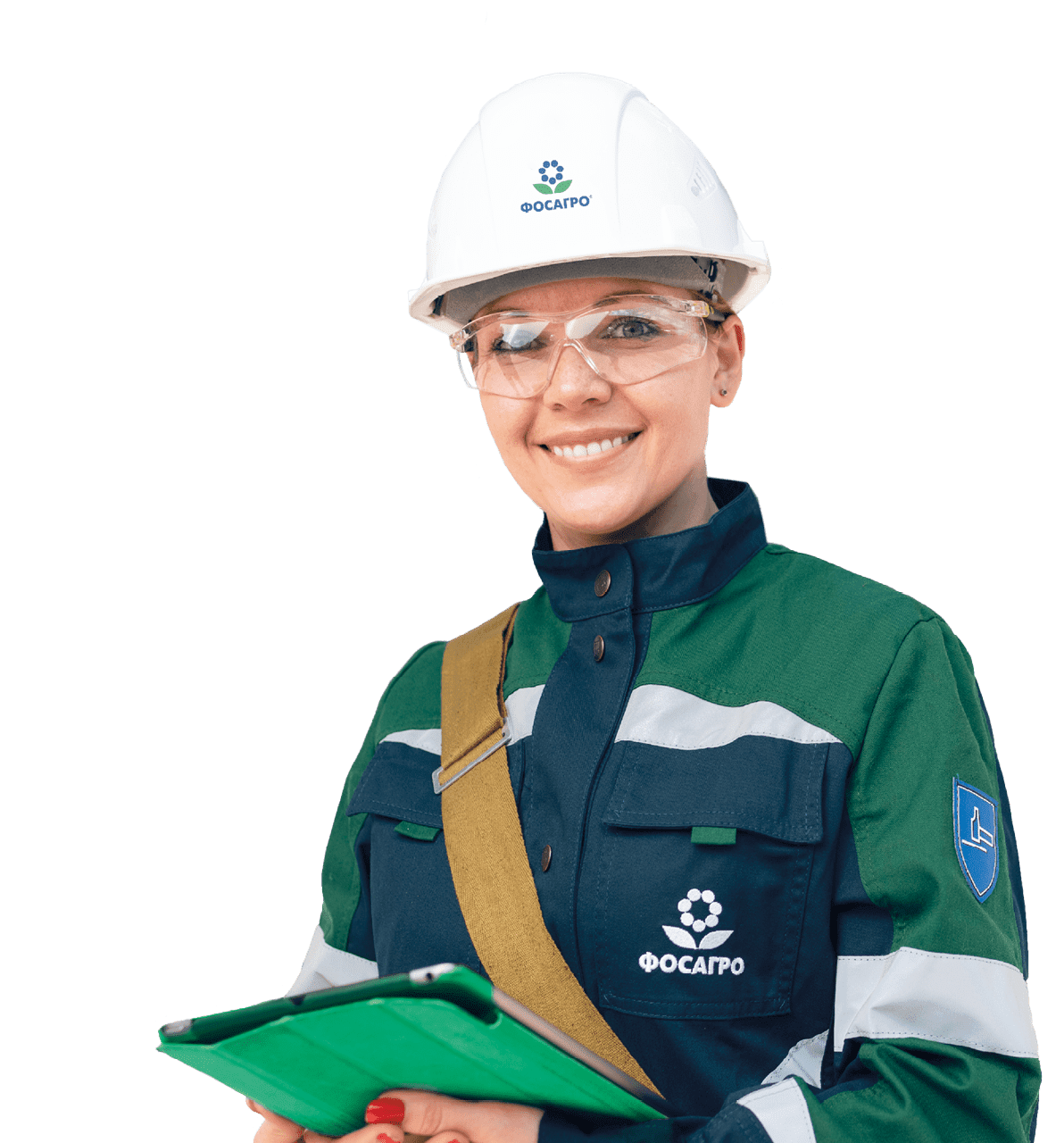
Our corporate training framework relies on the following principles:
In 2022, we continued to improve our corporate training programme by rolling out remote educational and development tools introduced during the pandemic, leveraging digital technologies and creating mixed training formats. The Company promotes a remote training system, creates online courses and upgrades technical capabilities by introducing computer simulators, and implementing VR technologies to support the learning process. The remote training system counts over 250 courses, while the VR library offers 12 programmes on occupational health and safety, and repairs of rotating equipment. We also provide our employees with opportunities for self-development by giving them access to our corporate electronic library and online training platform. In 2022, the Company partnered with Eduson, an educational platform, enabling its employees to complete over 17,000 courses and more than 2,600 tests. PhosAgro’s staff can also read and download business, professional and fiction books from Alpina’s online library.
The Company seeks to promote the greatest possible number of internal candidates from the talent pool to PhosAgro’s executive roles. Our programmes aim to identify employees who have proved their efficiency in current positions and have what it takes to expand the scope of responsibilities and move up to executive roles. The Company offers a wide range of training and development opportunities to help such employees achieve these goals.
The talent pool programmes include a variety of training options for talent pool members helping them to develop managerial and professional competencies, and to boost personal and business skills (analysis and decision-making, leadership, workflow management, motivation and delegation of powers, conflict settlement, project management, effective communications, etc.).
In 2021, the Company started to use mentoring as a vehicle for promoting participants of the Top 40 Talent Pool programme. Senior managers (mentors) share their experience and knowledge with the participants in an attempt to build a next-level management culture, while talent pool members get a chance to learn the secrets of successful management from executives.
The Top 40 Talent Pool programme offers opportunities to develop managerial competencies, pursue individual training at leading business schools, and benefit from mentoring support and personalised assistance. The main objective of training is to prepare the next generation of top-notch managers.
We are creating an environment conducive to an active experience and knowledge sharing by promoting the culture of coaching and mentorship. In 2022, a number of Top 40 Talent Pool participants took on the role of mentors themselves to coach middle and line managers from the talent pool.
Both talent pool development programmes and employee training initiatives seek to develop competencies required for progress against the Company’s goals and strategic projects and preventing personnel shortages. In 2023, we will continue our efforts to expand the talent pool.
One of the Company's focus areas in training and development is to improve management culture.
In 2022, PhosAgro set up the Rules of Effective Management project to train and support its managers.
is to strengthen management culture while also establishing and applying uniform rules for the supervisor-subordinate relationship to make staff interaction more effective.
The Rules of Effective Management help the Company's employees in their managerial activities, laying down the fundamental principles of building effective communication between a supervisor and a subordinate, which in turn bolsters employee loyalty and engagement.
The project was successfully completed in the pilot units (Ammonia-1, Ammonia-2 and Ammonia-3) and will be rolled out across other units of Apatit.
In 2022, four management practices were introduced in the pilot units:
- Stand-Up/Shift Meeting,
- Setting Targets,
- Feedback,
- Performance Discussion.

In 2022, we kept rolling out a virtual teaching package and a distance learning system to automate training and development processes.
This was needed because of:
- transition to remote work;
- demand for a specific range of professions;
- a large number of employees to be trained in various jobs;
- employees’ aspirations for self-learning and keeping their knowledge up to date.
The virtual teaching package includes:
- A matrix of 24 corporate, job-agnostic and job-specific competencies;
- Teaching packages for 15 corporate and job-agnostic competencies;
- Ten distance learning courses for corporate and job-agnostic competencies.
In addition to the earlier developed capabilities, in 2022 the Company unveiled:
Furthermore, during 2022 a personal account developed for the distance learning system was available for pilot running at all sites. The personal account features:
- mandatory multi-sectioned courses;
- courses to develop additional competencies;
- process flowcharts;
- student atlases, etc.
Lessons learned from the operation of the personal account will be used to automate HR management processes.
Going forward, we plan to roll out the project and achieve 100% coverage of the 59 most popular professions by theoretical courses in the distance learning format by 2026.
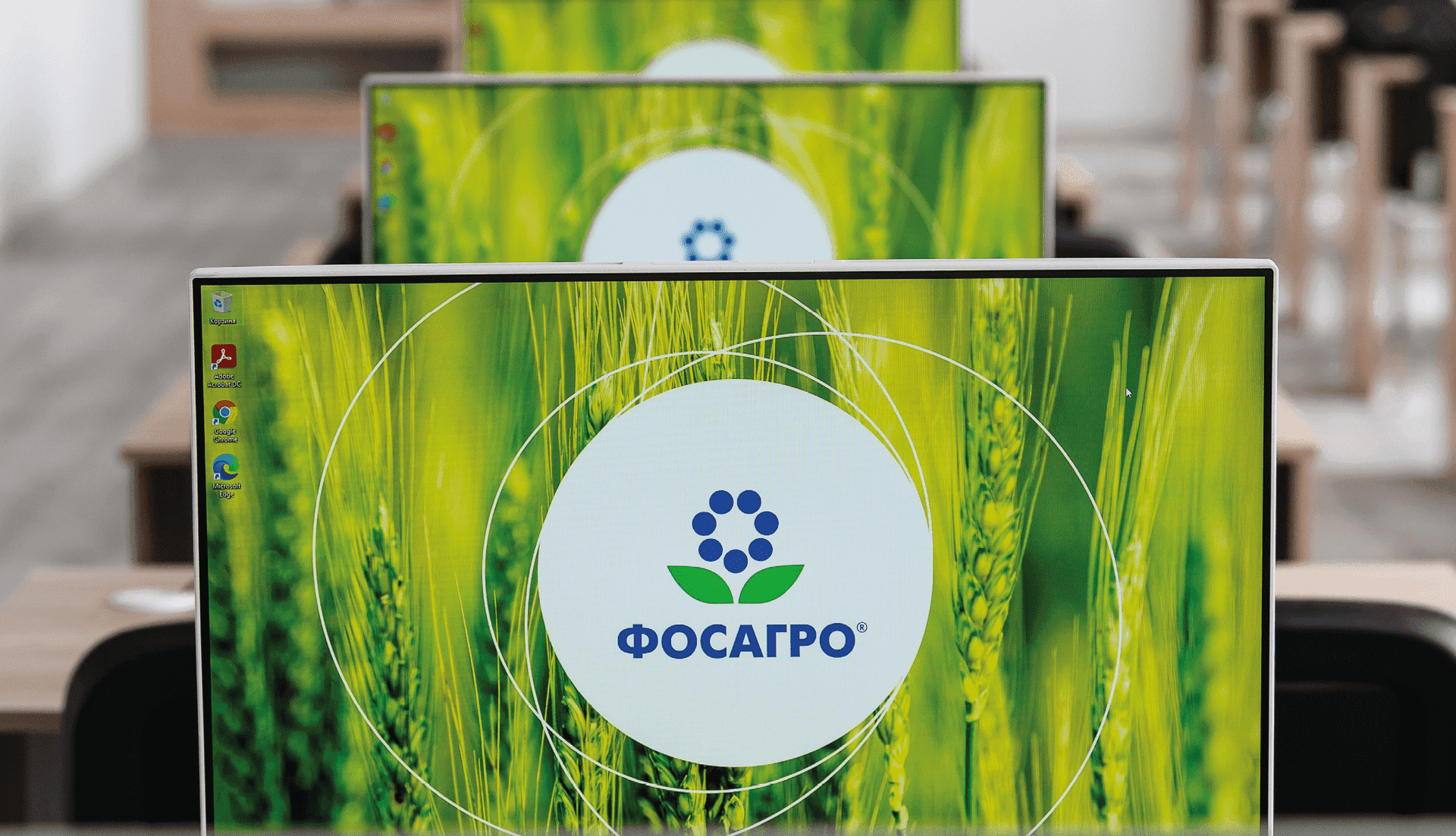
The programme’s key objectives are to:
PhosAgro Group is committed to facilitating the successful onboarding of new employees. In 2022, the Company continued its Mentoring programme: new hires are overseen by mentors – seasoned employees who teach professional skills and provide feedback, support, and assistance in onboarding.
To organise the mentoring process, we identified a pool of mentors (over 1,500 people so far). The selection criteria include qualifications and professional experience; perception by the team; organisational and training skills; and motivation to share experience and knowledge.
In the course of the programme, we developed and approved the mentor’s competence model. Potential mentors have their competences assessed and take part in corporate development programmes to learn more about personnel development and training approaches.
To promote the mentoring programme, the Company provides communication support and methodological assistance to mentors. We have developed check lists and guidelines for mentors, and post information about mentors on stands, hold meetings with them in business units, and they are featured in the corporate media.
On top of that, PhosAgro holds the annual Mentor of the Year corporate contest set to develop mentoring, make it more prestigious, raise employee awareness, and encourage and recognise mentors' personal contribution to the development of new hires. In 2022, 13 mentors from different assets of the Company took part in the Mentor of the Year super final.
In the coming year, we will continue to improve the mentoring programme to raise the quality of personnel training, reduce the turnover rate among new employees, and boost employee loyalty and engagement.
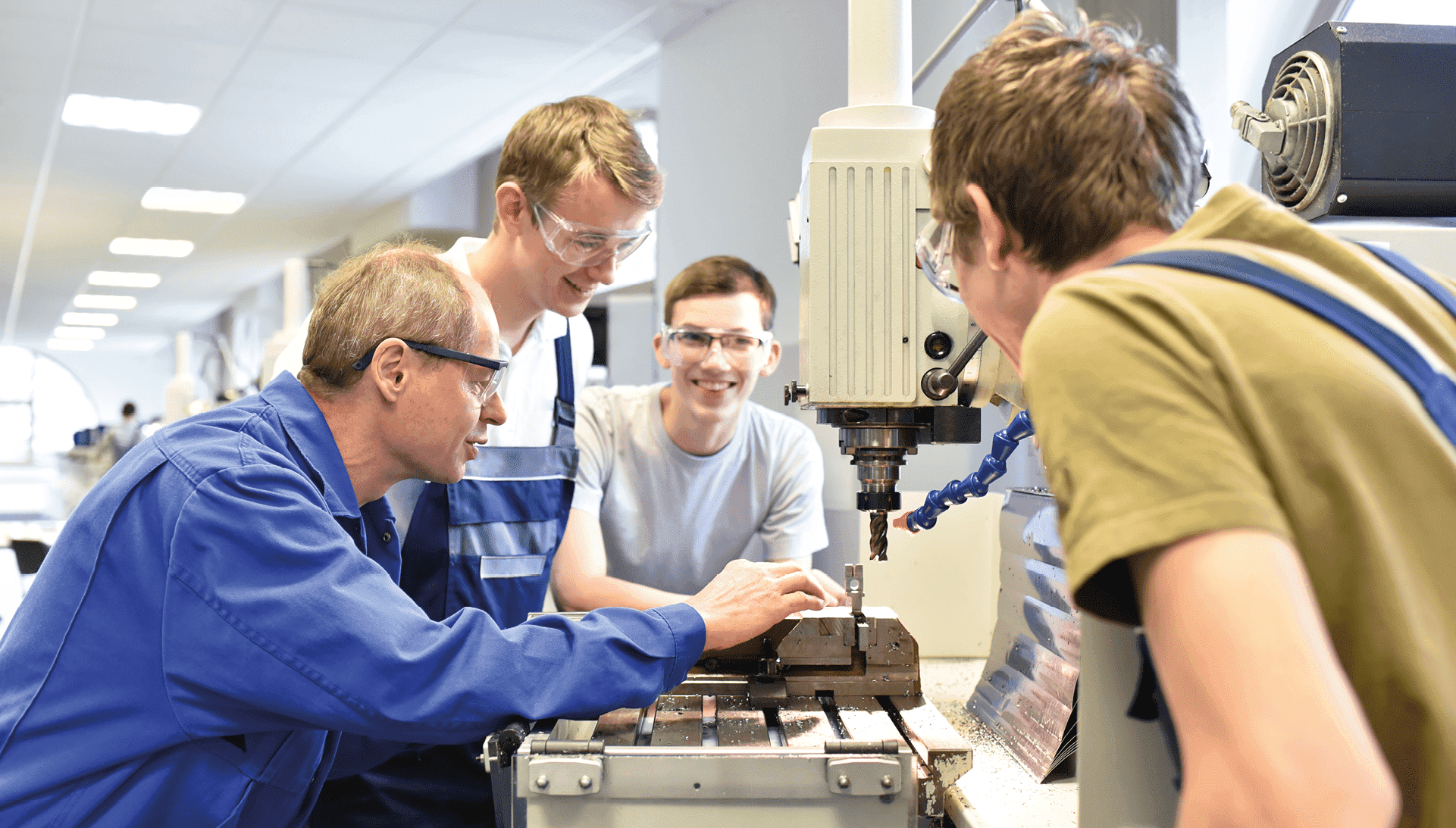
To assess HR management and make effective decisions in this area, we continuously monitor employee performance metrics and analyse the structure of staff costs, labour productivity, along with the performance of social, training, and other programmes.
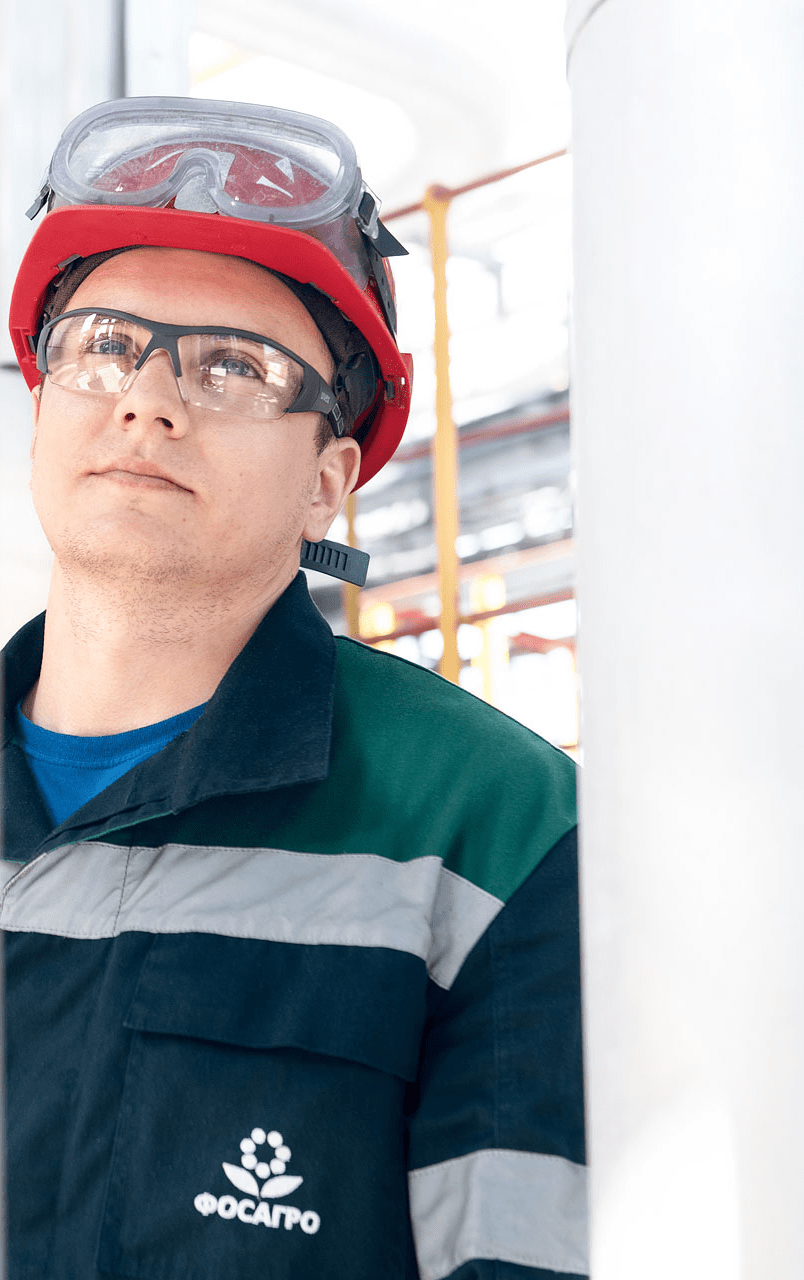
We continue to implement the PhosAgro Schools career guidance project.
Since 2013, the Company has invested overin it, including RUB 600 mln spent on renovations and equipment.
In 2022, funding for the project increasedthe funds were used, among other things, to further develop schools in Kirovsk and Apatity (Murmansk region). PhosAgro Schools not only develop educational and research auditoria and labs, but also implement career guidance projects to introduce the Company and its corporate culture to students, teachers, and parents.
Since 2019, 83 participants of the PhosAgro Class programme who graduated from dedicated universities have been hired by PhosAgro units, including 30 in 2022, to take engineering positions. Some 34 graduates of PhosAgro Classes are expected to be employed by the Company in 2023, with over 100 more by 2025.
More than
of 2022 have been admitted to higher educational institutions, with St Petersburg Mining University enjoying the highest popularity among them (25 students). Since 2015, over 900 graduates of PhosAgro Classes have been enrolled in higher educational institutions, with technical careers gaining more traction among them every year.
In September 2022, 125 new students started their 10th grade programme at PhosAgro Classes, marking the tenth admission round since the project launch.

PhosAgro has been implementing a school—college/university—facility career guidance model to train highly skilled workers since 2013. The Company has been consistently partnering with technical colleges across its footprint, including:
- Kirovsk branch of Murmansk Arctic State University (Murmansk region);
- Cherepovets College of Chemistry and Technology.
were trained for and received some of the key blue-collar jobs at the Company.
Our collaboration with technical colleges covers:
- setting up testing grounds and labs for students to acquire hands-on experience using real equipment;
- running internship programmes at PhosAgro’s facilities with mentors;
- supporting undergraduate and graduate thesis research;
- organising and engaging students in sports, educational, and research initiatives, competitions, Olympiads.
PhosAgro also supports a Training Centre at the Cherepovets College of Chemistry and Technology that offers express programmes in chemistry and associated fields to nurture talent for most in-demand jobs.
In 2022, the college also took part in Professionalism, a federal project set to “reload” vocational education. PhosAgro is providing financial support for an internship-focused training programme for the professions: Inorganic Production Operator and Installation, Maintenance, and Operation of Industrial Equipment.
In 2022, as part of cooperation with PhosAgro under a federal programme, the Cherepovets College of Chemistry and Technology was the only educational institution of the chemical industry cluster to make it the Top 10 clusters of the Professionalism project, demonstrating a high level of performance.
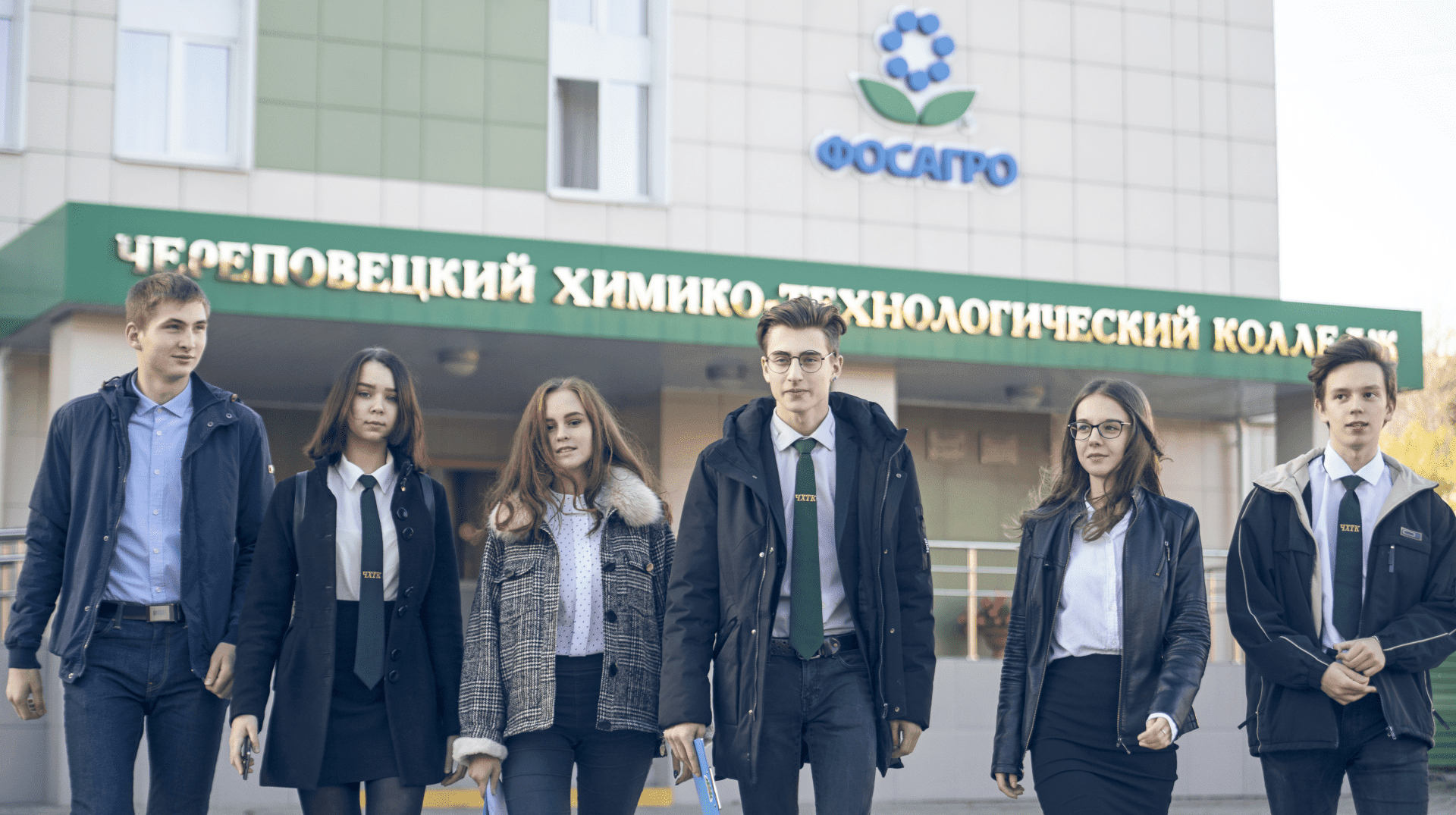
As part of the school–college/university–facility educational model, the Company has built a system of cooperation with universities to provide high-quality and affordable education and support research.
As part of its collaboration with universities, PhosAgro:
- sponsors advanced training for graduates of PhosAgro Classes in the fields relevant to PhosAgro (subject to their commitment to future employment at the Company);
- offers scholarships to the most talented students (based on exam results);
- invites university students to take a tour of one of the Company's facilities;
- offers students a job in one of the Company’s popular specialisations after they graduate;
- allocates money for repair and equipment of chemistry laboratories at dedicated universities.
We have cooperation agreements and roadmaps with many universities.
For the recent 10 years, the Company has been running the High-Potential Graduates programme based on its cooperation with universities. The initiative fosters contact with graduates wishing to work at PhosAgro.
The High-Potential Graduates corporate programme offers a competitive salary, as well as relocation and housing support. Each new hire is supervised by an experienced mentor.
In 2022,
This brings the total number of graduates who have joined the Company since the launch of the university engagement programme to
of these employees are still with PhosAgro today, pursuing careers in such areas as mineralogy, geology, hydraulic engineering, chemistry, thermal energy and electricity generation, rail transport, open-pit and underground mining, and mine surveying.
Of the programme participants still employed at PhosAgro as at December 2022,
had received promotions and had been included in our talent pool, and many of them had successfully completed the projects assigned to them upon recruitment.
In 2023, we plan to “reload” and transform the High-Potential Graduates programme into a corporate PhosAgro-START programme. The programme’s main objectives will be to build a talent pool for key positions within the Company and to identify career paths for young talented professionals to prepare future executives and set up a pool of internal experts.
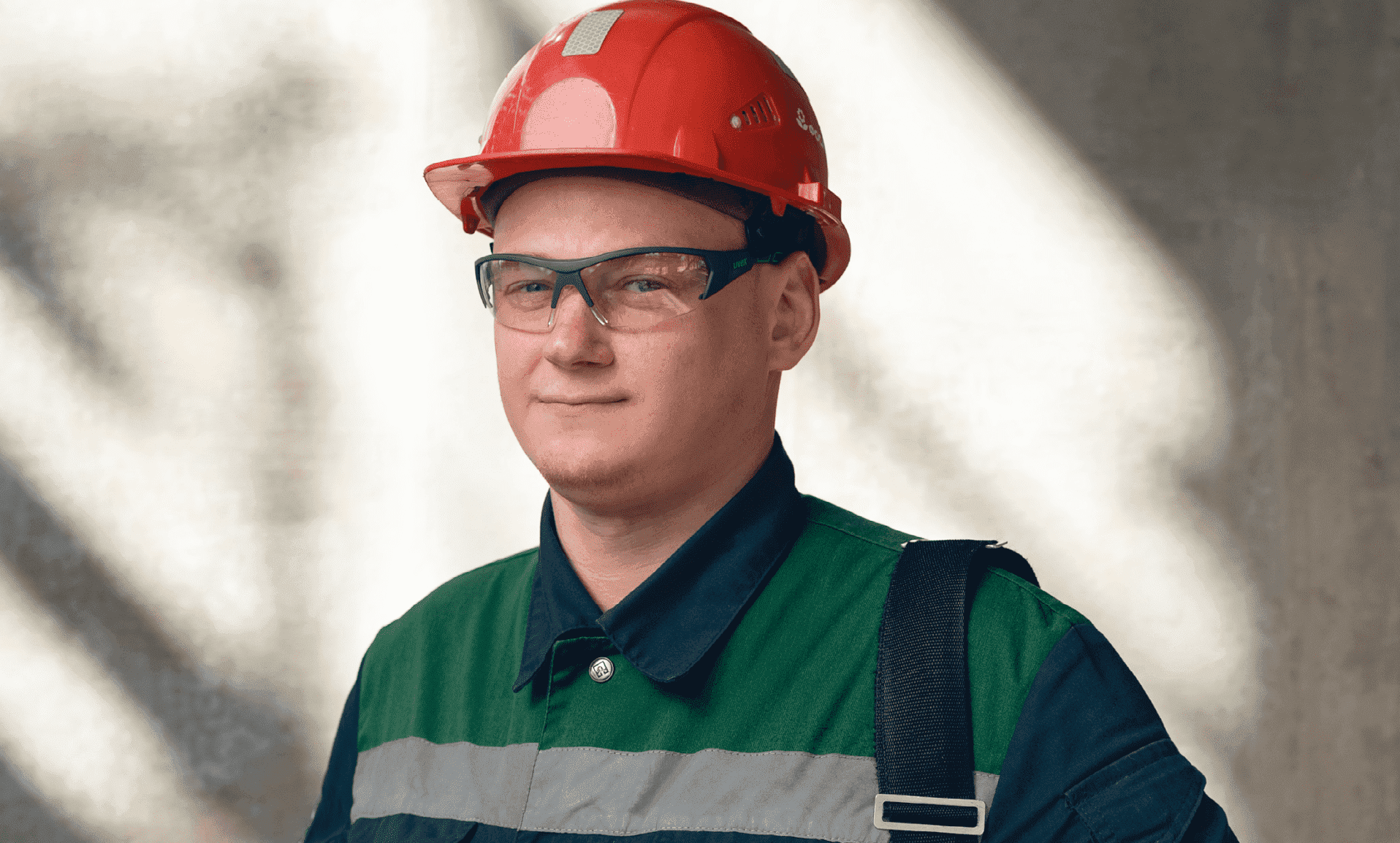
Incentives and rewards
Our robust system of rewards is aligned with the Company’s performance and motivates all employees to improve their performance in order to achieve our business goals. The purpose of the incentives and rewards system is to incentivise staff in order to increase productivity and deliver strong operating results, as well as to retain qualified talent.
Due to the nature of our operations, there are generally more male employees than female ones. At PhosAgro, we believe that professionalism, sustainably strong performance and adherence to corporate values are prerequisites for and the only guarantee of career growth.
Our regulations on labour relations, remuneration and social benefits cover all employees and underpin the principle of equitable remuneration and rewards. We comply with the principle by implementing a remuneration framework that offers equal pay to employees in equivalent positions, regardless of their gender.
Our system ensures:
using a transparent system of KPIs to calculate managerial rewards
to motivate blue-collar employees to deliver against their targets
of financial and non-financial rewards
to global best practices on benefit packages
by social programmes
of benefits for certain employee categories


In the reporting period, wages and salaries grew for all categories of staff as a result of the 3–4% wage indexation on 1 September 2021 and 12% wage indexation on 1 February 2022, along with targeted pay reviews and incentive programmes.
Social benefits and employee guarantees
We provide comprehensive social support to our employees, and every year we increase funding for voluntary health insurance, financial assistance and corporate housing programmes.
Collective Bargaining Agreements provide for a range of relevant benefits as part of the government programme to support families, mothers, and children. Recreational summer health resorts and specialised excursions are organised for employees' children on an annual basis. All children of employees between the ages of 0 and 14 receive New Year presents.
PhosAgro provides employees with vouchers to local and southern health resorts and corporate health resorts. Employees and their family members, as well as veterans, have access to corporate health resorts at a reduced price.
A range of social support measures and leisure activities are available to the Company’s veterans, and a corporate retirement plan is in place.
Employees can also seek psychological, financial, and legal assistance and receive advice on an active lifestyle, including the use of telemedicine. Healthy eating programmes are being introduced and a nutritionist is available to employees.
In 2022, we implemented major projects worth over RUB 300 mln to improve working conditions at our facilities. For example, repairs were carried out on lounge, shower and meeting rooms, staircases, and corridors in administrative and production facilities.
